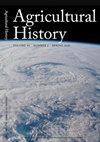流浪汉、小麦和气候不稳定,1870-1922
IF 0.5
3区 哲学
Q1 HISTORY
引用次数: 0
摘要
本文探讨了早期移民工人(“收割手”或“流浪汉”)在美国小麦工业中的作用。它认为,干旱和其他气候灾害的持续威胁给工人造成了一种气候不稳定的状态。在大平原多变的气候下,这些灾害无法预测,雇主转而将气候风险转嫁给贫困的移民,他们的合同是临时的、非正式的,可以在几个小时内签订、完成或终止。它收集了来自大平原上一万多份报纸的数据,不仅展示了收割工人的就业情况如何随着气候的变化而变化,而且还展示了气候的不稳定性如何在收割工人到达该州时才变得明显。这使得雇主几乎不可能提前计划劳动力,因为对收割手的需求甚至每年都有很大的变化。尽管政府和工会的行动指出了可能的替代制度,但它们从未出现。最终,流浪汉小麦情结是气候和工业资本主义的一个新兴属性,没有任何团体或权威的计划,而是由各自的选择所决定的。本文章由计算机程序翻译,如有差异,请以英文原文为准。
Hoboes, Wheat, and Climate Precarity, 1870–1922
This article explores the role of early migrant workers (“harvest hands” or “hoboes”) in the American wheat industry. It argues that the constant threat of drought and other climatic disasters created a state of climate precarity for workers. In the variable climate of the Great Plains, these disasters could not be forecast, and employers instead shunted climatic risk onto impoverished migrants, whose contracts were ad hoc, informal, and could be made, completed, or broken in a matter of hours. It compiles data from over ten thousand newspapers in the Great Plains to show not only how harvest hand employment varied with the climate but also how climatic instability often only became apparent as harvest hands arrived in the state. This made it virtually impossible for employers to plan ahead for labor, as the demand for harvest hands could vary dramatically even from year to year. Though government and union action pointed the way to possible alternative systems, they never emerged. Ultimately, the hobo-wheat complex was an emergent property of climate and industrial capitalism, unplanned by any group or authority, made by the choices of each.
求助全文
通过发布文献求助,成功后即可免费获取论文全文。
去求助
来源期刊

Agricultural History
农林科学-科学史与科学哲学
CiteScore
0.70
自引率
16.70%
发文量
58
审稿时长
>36 weeks
期刊介绍:
Agricultural History is the journal of record in the field. As such, it publishes articles on all aspects of the history of agriculture and rural life with no geographical or temporal limits. The editors are particularly interested in articles that address a novel subject, demonstrate considerable primary and secondary research, display an original interpretation, and are of general interest to Society members and other Agricultural History readers.
 求助内容:
求助内容: 应助结果提醒方式:
应助结果提醒方式:


